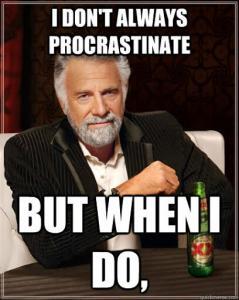
I met someone at an event recently who asked: “Where did you find time to write your book?” If you’ve not seen the recent blog post, I published a book on management on January 16th. The answer I provided to him was two-fold: prioritise and avoid procrastinating.
I’m a natural-born citizen of the Procrasti-Nation. I noticed this years ago when I artificially created pressure for myself by allowing deadlines to get very close before I would finish the related work. I made life easier on myself by starting in advance, but I would often flirt with timeline-driven disaster. That said, I was never quite as bad as Tim Urban, who, as he wrote in this blog post from 2013, would wait for the panic monster to strike before he started work. If you’ve never read any of “Wait, But Why”, Tim’s blog site, I strongly recommend a read.
Over time, I realised that this was a pretty unhealthy (and somewhat ludicrous) way to behave. I started to set goals for myself. I then started to time-box those goals, so that I would create pressure in a more natural way. This worked pretty well for a while, but it’s only part of the puzzle. In order to make real progress in key areas of your life, you have to prioritise your goals.
Why is prioritisation so important? If we don’t prioritise, we can expend effort on things that have little value – either by performing work that doesn’t feed our most important goals or by wasting time entirely by procrastinating in the darks of the Interweb.
In “The 4 Disciplines of Execution“, Sean Coveney, Chris Chesney and their fellow authors deal with the first case. The daily work we can fill our days with – “the whirlwind”, as they describe it – will consume all available working hours. Create prioritised goals (only one or two), what the authors call “Wildly Important Goals” or WIGs. By then focusing all of our activities on those goals, we can make tremendous progress on the things that are most important to us.
There is a catch. In order to identify our most important goals, we have to put in some work. The serial procrastinators among us will know the trap here – rather than spending the time to document their goals and focus on them, they will procrastinate.
Here’s my suggestion to those of you who fall into this bucket, from a now mostly-reformed procrastinator. Think about how much better your life could be in one area if you just focused on doing the thing that would make that area better; be it your relationship, your day job, or your side gig if you have one. Then just START WORKING! That’s all it takes. Every day, do a little bit more towards that goal. For the book, I did a small amount of work every weekend – I can only write at the weekends, due to the demands of my day job. After a year and a half or so, I had a book. While it will never be a best-seller, I wrote in in a year when I had three reporting lines at work, dealt with two surgeries and balanced my home life. That requires prioritisation – an ongoing effort to focus on just one or two things at a time. It also requires that we not give up.
So, what are you waiting for? GET AFTER IT.
|
|

